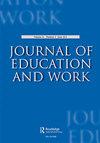参与7级学徒学习的挑战、障碍和策略
IF 1.7
Q2 EDUCATION & EDUCATIONAL RESEARCH
引用次数: 2
摘要
本研究探讨了学徒在学位水平课程中的生活经历,以及他们对学徒学习中不是传统学位学习组成部分的元素(即脱产培训)如何影响他们的学习之旅的看法。本文在对11位学徒进行定性访谈后进行了专题分析,这些学徒都是即将结束学徒期的早期职业学术专业人士。主要研究结果提供了一个复杂的图景,并表明学徒的学习习惯和偏好是个人的,并受到就业工作量和获得非工作学习时间的影响。学徒们表示,许多因素影响了他们利用分配的离职学习时间的能力,主要是从工作中解脱出来的能力,以及满足学习、商业和个人需求之间的冲突。学徒们表示,在现实中,他们几乎不可能把20%的工作时间用于学习。向机构和个人提出了关于需要进行良好对话和消除障碍的建议,以确保学徒能够满足学徒学习的合同要求。本文章由计算机程序翻译,如有差异,请以英文原文为准。
Challenges, barriers and strategies for engaging in level 7 apprenticeship studies
ABSTRACT This study explores the lived experience of apprentices on a degree-level programme and their perceptions of how elements of apprenticeship study that aren’t components of traditional degree study – i.e. off-the-job training – impact their learner journey. This article undertakes a thematic analysis following qualitative interviews with eleven apprentices, who are early-career academic professionals nearing the end of their apprenticeships. Key findings offer a mixed picture, and suggest that the study habits and preferences of apprentices are personal to individuals and are impacted on by employment workload and access to off-the-job study time. Apprentices indicate that many factors encroach on their ability to utilise the allocated off-the-job study time, primarily the ability to be released from employed work and conflicting priorities around meeting study, business, and personal needs. Apprentices suggest that in reality it is almost impossible for them to spend 20% of their working time on their studies. Recommendations are offered to both institutions and individuals, regarding the need for sound dialogue and the removal of barriers to ensure that apprentices can meet the contractual requirements of apprenticeship study.
求助全文
通过发布文献求助,成功后即可免费获取论文全文。
去求助
来源期刊

Journal of Education and Work
EDUCATION & EDUCATIONAL RESEARCH-
CiteScore
2.70
自引率
14.30%
发文量
40
期刊介绍:
The Journal of Education and Work is an international forum for academic research and policy analysis which focuses on the interplay of the education and economic systems. The journal examines how knowledge, skills, values and attitudes both about and for work and employment are developed within the education system. The journal also explores the various forms of industrial training and accreditation in the economic system, including changes in the economic and industrial infrastructure which influence the type of employees required. Work in the informal economy is also included.
 求助内容:
求助内容: 应助结果提醒方式:
应助结果提醒方式:


